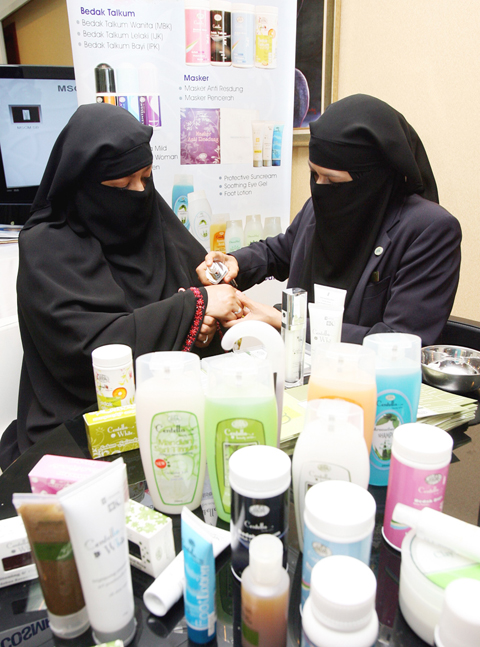Entrepreneurs producing halal cosmetics say the global market is booming as more Muslims opt for beauty products that conform to Islamic rules.
Famiza Zulkifli made her first halal soap four years ago, after searching in vain for the right products to bathe her baby. Now her business has an annual turnover of US$1.6 million.
“Halal is an issue for Muslims. At the end of the day, everyone will die and God will ask you what have you done,” the Malaysian singer-turned-entrepreneur said.

PHOTO: AFP
Famiza, who unusually for a Malaysian woman wears the black niqab that only reveals her eyes, now exports dozens of top-to-toe beauty products to Indonesia, Cambodia, Thailand and Brunei.
The concept of halal, which means “permissible” in Arabic, is mainly applied to food. Pork and its by-products, animals not slaughtered according to Koranic procedures and alcohol are all haram, or forbidden.
CASHING IN
However, manufacturers are cashing in on the concept that virtually all goods and services can be certified halal, including cosmetics, pharmaceuticals, clothing, financial services and even tour packages.
Like their conventional counterparts, halal cosmetics — including lipstick, deodorant and alcohol-free perfume — can contain animal ingredients, but they must be prepared according to Islamic codes on slaughter and preparation.
“Even the small amount of collagen in our night cream is derived from halal sheep raised at a Muslim-run farm in Australia,” Famiza said, adding that she plans to expand her business from Southeast Asia to Europe next year.
Nearly a quarter of the world’s population are Muslims and the global halal business, estimated by a Malaysian research company to be worth US$635 billion a year, has expanded from Islamic countries to Western nations with growing Muslim populations.
In France, which is home to about 5 million Muslims, sales of halal food are forecast to hit 5.5 billion euros (US$7 billion) this year, according to an industry spokesman.
The halal cosmetics business — estimated to reach US$560 million globally — is seen by analysts as next in line for growth after the lucrative halal food and Islamic finance sectors.
‘GREEN WAVE’
Mah Hussain-Gambles, founder of the first halal cosmetics company in Europe, Saaf Pure Skincare, said the industry had also benefitted from a “green wave” and that 75 percent of her customers are non-Muslims.
“The principles are the same — they want something that doesn’t harm the body, the purity and that is exactly the same as the halal movement,” she said.
“I create an eco-ethical brand which is organic, vegetarian and halal — they are all important elements to me,” she said, adding that demand “is getting out of control”.
“The enquiries are from everywhere. Last week there were enquiries from Bangladesh, Canada, Australia, Belgium and Malaysia — it’s just too much work,” she said.
Abdalhamid David Evans, a British expert on the halal business, said more manufacturers would jump on the bandwagon as Muslims choose halal products to reinforce their identity while others become more eco-conscious.
“People are becoming increasingly concerned about those things and they become a marketing issue,” said Evans, of Imarat Consultants.
“Without a doubt, [the halal cosmetics industry] is going to be big,” he said on the sidelines of the first international halal cosmetics and toiletries conference, which was held in Malaysia last month.

SECURITY: As China is ‘reshaping’ Hong Kong’s population, Taiwan must raise the eligibility threshold for applications from Hong Kongers, Chiu Chui-cheng said When Hong Kong and Macau citizens apply for residency in Taiwan, it would be under a new category that includes a “national security observation period,” Mainland Affairs Council (MAC) Minister Chiu Chui-cheng (邱垂正) said yesterday. President William Lai (賴清德) on March 13 announced 17 strategies to counter China’s aggression toward Taiwan, including incorporating national security considerations into the review process for residency applications from Hong Kong and Macau citizens. The situation in Hong Kong is constantly changing, Chiu said to media yesterday on the sidelines of the Taipei Technology Run hosted by the Taipei Neihu Technology Park Development Association. With

A US Marine Corps regiment equipped with Naval Strike Missiles (NSM) is set to participate in the upcoming Balikatan 25 exercise in the Luzon Strait, marking the system’s first-ever deployment in the Philippines. US and Philippine officials have separately confirmed that the Navy Marine Expeditionary Ship Interdiction System (NMESIS) — the mobile launch platform for the Naval Strike Missile — would take part in the joint exercise. The missiles are being deployed to “a strategic first island chain chokepoint” in the waters between Taiwan proper and the Philippines, US-based Naval News reported. “The Luzon Strait and Bashi Channel represent a critical access

CARROT AND STICK: While unrelenting in its military threats, China attracted nearly 40,000 Taiwanese to over 400 business events last year Nearly 40,000 Taiwanese last year joined industry events in China, such as conferences and trade fairs, supported by the Chinese government, a study showed yesterday, as Beijing ramps up a charm offensive toward Taipei alongside military pressure. China has long taken a carrot-and-stick approach to Taiwan, threatening it with the prospect of military action while reaching out to those it believes are amenable to Beijing’s point of view. Taiwanese security officials are wary of what they see as Beijing’s influence campaigns to sway public opinion after Taipei and Beijing gradually resumed travel links halted by the COVID-19 pandemic, but the scale of

Pope Francis is be laid to rest on Saturday after lying in state for three days in St Peter’s Basilica, where the faithful are expected to flock to pay their respects to history’s first Latin American pontiff. The cardinals met yesterday in the Vatican’s synod hall to chart the next steps before a conclave begins to choose Francis’ successor, as condolences poured in from around the world. According to current norms, the conclave must begin between May 5 and 10. The cardinals set the funeral for Saturday at 10am in St Peter’s Square, to be celebrated by the dean of the College